Give Them What They Want Part 2
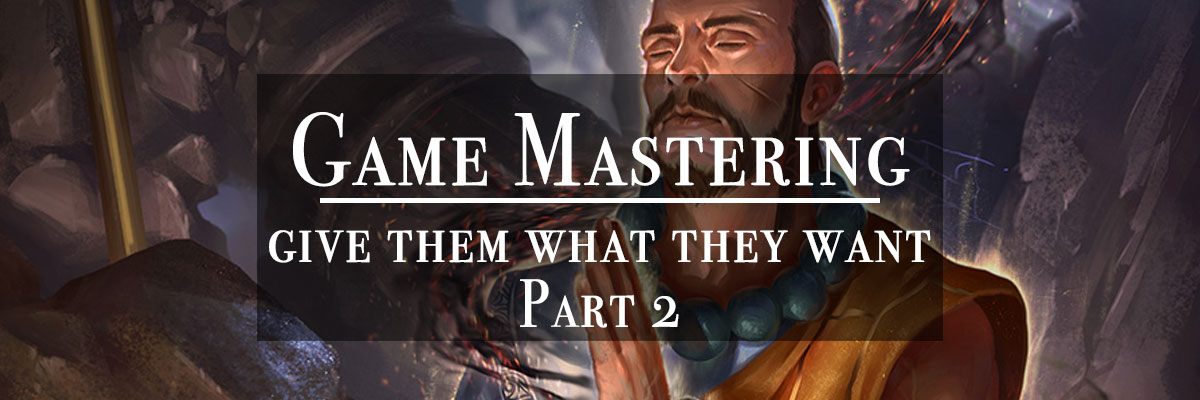
As a game built upon exceptions-based rules, each choice made during character creation is very likely to reflect upon the player’s desire to connect with specific parts of the game. There are a limited number of these choices available and getting the most out of play means focusing your choices on the stuff you want to do as a player. We previously looked at how these choices can interact with the pacing and structure of your adventure. Using a few common examples, we looked at methods of adjusting adventure structure or pacing to incorporate them successfully into a story or campaign.
Designing an adventure, campaign, or even one-shot that empowers your players to have the kind of experience they will most enjoy requires examining these choices for the wealth of information that they can provide. In the second installment of this three-part series, we will examine a few of the classes that can have the strongest relationships with the narrative of the game and ways to accommodate the players interested in the experiences they offer.
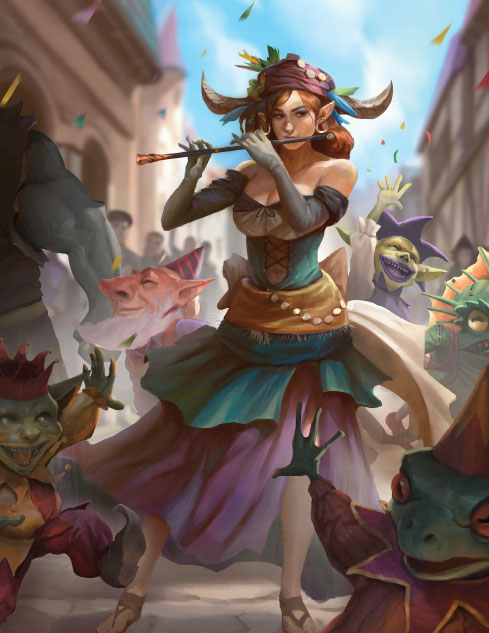
Bards. Intelligently leveraging Expertise dramatically increases the odds of succeeding at ability checks involving the chosen skill. Bards are joined in this exploit by rogues. Both classes have easy access to a number of skills that synergize with ability scores that are used by other core class abilities. With the potency of their skills dialed up in this way, they can dominate exploration and social interaction encounters, where ability checks are often used as the primary challenge.
Instead of simply ratcheting up the DC of ability checks and putting other players out of reach of success, take the extra time to scrutinize the need for each ability check. In a previous article, we looked at passive skills and when and how to use them. Providing opportunities for other players to take advantage or create low-pressure situations where the odds of success are in their favor keeps them from feeling the sting of falling behind without removing the relevancy of Expertise.
Alternatively, start designing scenarios where a successful ability check only reveals a victory condition rather than standing in for it. For example, when attempting to persuade the queen to lend her army in support of the coming war a successful Charisma (persuasion) check (or a series of them) will convince her of the legitimacy of your cause, but she will not send her general into battle without her family’s royal banner. The one that is interred with the remains of her grandfather. Deep within the haunted barrows far to the north.
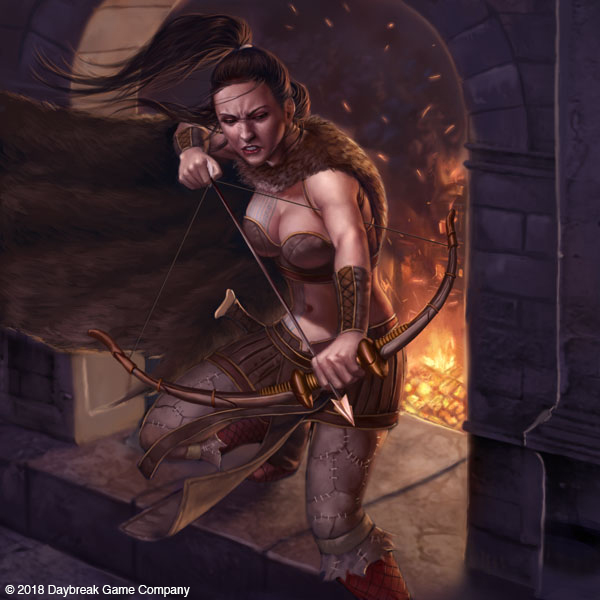
Rangers. Exploring within their favored terrain, rangers can ignore a multitude of natural obstacles. Running out of food and water, getting lost, and stumbling upon dangerous wildlife are frequent staples of exploration encounters. The ranger rarely needs to deal with these difficulties. The Outlander background confers similar benefits, as does the spell heroes feast. Often players that gravitate towards these character options have little interest in the minutiae that makes wilderness survival stories compelling for other players and DMs.
Resource management and trailblazing are only part of the challenges that can lurk in the wilderness. An oft neglected obstacle presented by the wilderness is the time that it takes to cross such expanses. If your adventures feature tasks or elements that are only successful when completed within a narrow window of time, your players will still feel pressure from travel despite having to circumvent other perilous elements of the journey. Even small setbacks that might occur while traveling can create tremendous opportunities for the machinations of the character’s enemies to create new and deadly challenges.
You might opt instead to focus on the positive. Ability checks made during travel and exploration might have the potential for revealing mysterious locations or troves of precious resources. Once such a locale is discovered, players will feel a sting of failure when they fail to uncover new sites. Exploring these locations to plunder their riches or garner their benefits will take time, which can create a tense choice if the primary adventure contains time-sensitive elements.
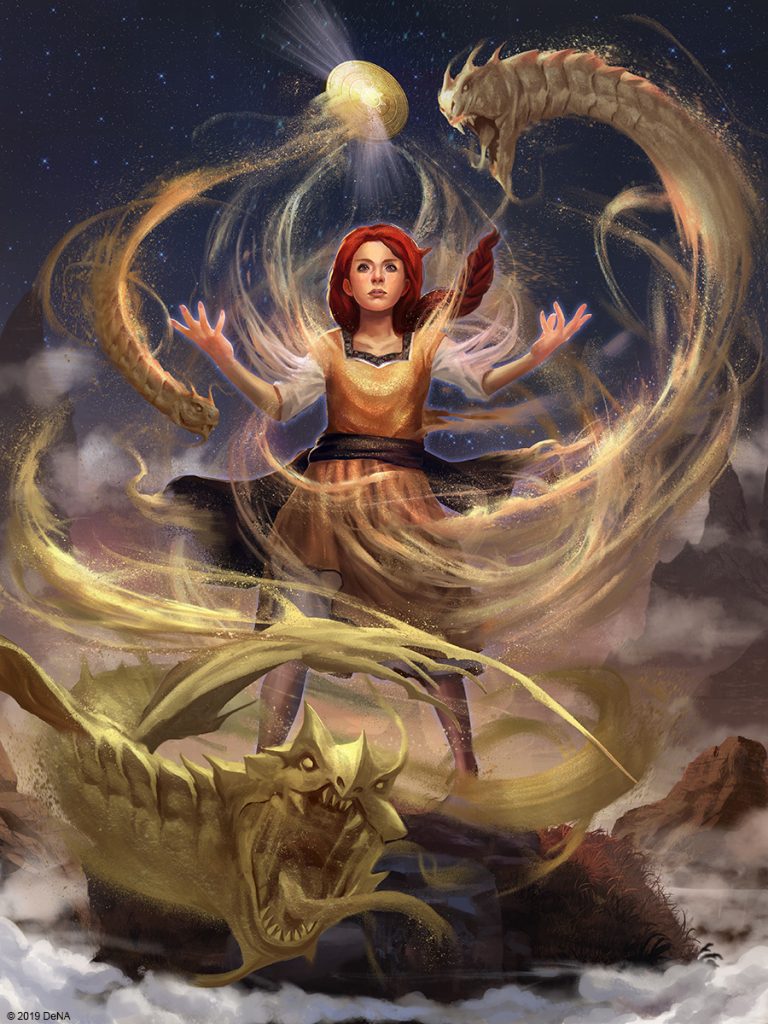
Wizards. It is common knowledge that there are certain potent spells that trivialize otherwise challenging situations. When they are unexpected or unaccounted for, they can derail plots and destabilize games. A common impulse from DMs that have weathered these unfortunate experiences is to ban such spells or to always actively employ countermeasures to prevent them from working as intended. This can cause players to feel frustrated that the spells they invested in are never given an opportunity to live up to the reputation of magic in the game.
Players are selecting them because of the sense of empowerment and accomplishment they bring. Trying to circumvent or block the use of these spells diminishes the fun the players have with these spells. Instead, find ways to build them into your plots. Sometimes this will mean accepting that scrying will provide the players with an opportunity to plan a way to steamroll an encounter. That’s okay – this is the scenario that players are looking for when they learn those divinations spells.
There can certainly be occurrences of too much of a good thing. Some enemies will be prepared for scrying. Some distances will be too great to cross in a single round with fly. Being aware of the arsenal of spells that your players are able to bring to bear will allow you to create scenarios and place them in environments that both feel natural and contain elements that the players can exploit with their magic to give them a spectacular moment in the spotlight.
Next time, in the closing of this series, we will explore the various ways that class choices impact which monsters the players want to encounter and conclude with advice for Dungeon Masters on how to incorporate their interests when it conflicts with the interests players are expressing through the choices they have made building their characters.

David Adams
Part-time freelancer, full-time wizard. Works for coin or spell scrolls.
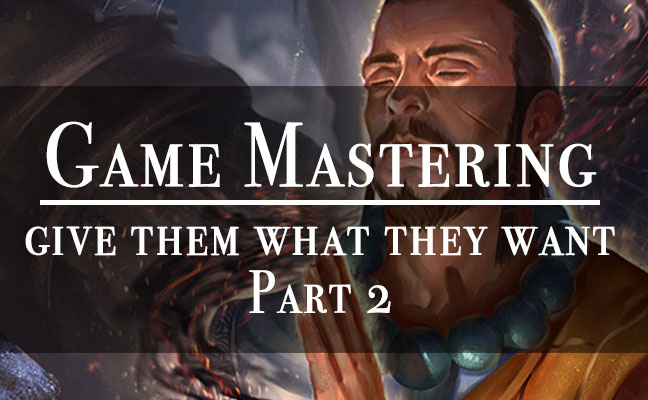
As a game built upon exceptions-based rules, each choice made during character creation is very likely to reflect upon the player’s desire to connect with specific parts of the game. There are a limited number of these choices available and getting the most out of play means focusing your choices on the stuff you want to do as a player. We previously looked at how these choices can interact with the pacing and structure of your adventure. Using a few common examples, we looked at methods of adjusting adventure structure or pacing to incorporate them successfully into a story or campaign.
Designing an adventure, campaign, or even one-shot that empowers your players to have the kind of experience they will most enjoy requires examining these choices for the wealth of information that they can provide. In the second installment of this three-part series, we will examine a few of the classes that can have the strongest relationships with the narrative of the game and ways to accommodate the players interested in the experiences they offer.

Bards. Intelligently leveraging Expertise dramatically increases the odds of succeeding at ability checks involving the chosen skill. Bards are joined in this exploit by rogues. Both classes have easy access to a number of skills that synergize with ability scores that are used by other core class abilities. With the potency of their skills dialed up in this way, they can dominate exploration and social interaction encounters, where ability checks are often used as the primary challenge.
Instead of simply ratcheting up the DC of ability checks and putting other players out of reach of success, take the extra time to scrutinize the need for each ability check. In a previous article, we looked at passive skills and when and how to use them. Providing opportunities for other players to take advantage or create low-pressure situations where the odds of success are in their favor keeps them from feeling the sting of falling behind without removing the relevancy of Expertise.
Alternatively, start designing scenarios where a successful ability check only reveals a victory condition rather than standing in for it. For example, when attempting to persuade the queen to lend her army in support of the coming war a successful Charisma (persuasion) check (or a series of them) will convince her of the legitimacy of your cause, but she will not send her general into battle without her family’s royal banner. The one that is interred with the remains of her grandfather. Deep within the haunted barrows far to the north.

Rangers. Exploring within their favored terrain, rangers can ignore a multitude of natural obstacles. Running out of food and water, getting lost, and stumbling upon dangerous wildlife are frequent staples of exploration encounters. The ranger rarely needs to deal with these difficulties. The Outlander background confers similar benefits, as does the spell heroes feast. Often players that gravitate towards these character options have little interest in the minutiae that makes wilderness survival stories compelling for other players and DMs.
Resource management and trailblazing are only part of the challenges that can lurk in the wilderness. An oft neglected obstacle presented by the wilderness is the time that it takes to cross such expanses. If your adventures feature tasks or elements that are only successful when completed within a narrow window of time, your players will still feel pressure from travel despite having to circumvent other perilous elements of the journey. Even small setbacks that might occur while traveling can create tremendous opportunities for the machinations of the character’s enemies to create new and deadly challenges.
You might opt instead to focus on the positive. Ability checks made during travel and exploration might have the potential for revealing mysterious locations or troves of precious resources. Once such a locale is discovered, players will feel a sting of failure when they fail to uncover new sites. Exploring these locations to plunder their riches or garner their benefits will take time, which can create a tense choice if the primary adventure contains time-sensitive elements.

Wizards. It is common knowledge that there are certain potent spells that trivialize otherwise challenging situations. When they are unexpected or unaccounted for, they can derail plots and destabilize games. A common impulse from DMs that have weathered these unfortunate experiences is to ban such spells or to always actively employ countermeasures to prevent them from working as intended. This can cause players to feel frustrated that the spells they invested in are never given an opportunity to live up to the reputation of magic in the game.
Players are selecting them because of the sense of empowerment and accomplishment they bring. Trying to circumvent or block the use of these spells diminishes the fun the players have with these spells. Instead, find ways to build them into your plots. Sometimes this will mean accepting that scrying will provide the players with an opportunity to plan a way to steamroll an encounter. That’s okay – this is the scenario that players are looking for when they learn those divinations spells.
There can certainly be occurrences of too much of a good thing. Some enemies will be prepared for scrying. Some distances will be too great to cross in a single round with fly. Being aware of the arsenal of spells that your players are able to bring to bear will allow you to create scenarios and place them in environments that both feel natural and contain elements that the players can exploit with their magic to give them a spectacular moment in the spotlight.
Next time, in the closing of this series, we will explore the various ways that class choices impact which monsters the players want to encounter and conclude with advice for Dungeon Masters on how to incorporate their interests when it conflicts with the interests players are expressing through the choices they have made building their characters.

David Adams
Part-time freelancer, full-time wizard. Works for coin or spell scrolls.

0 Comments